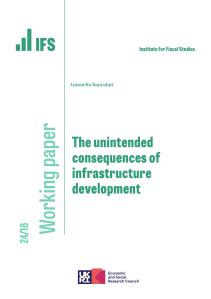The manifestos of all major parties tell us little about the outlook for funding of individual public services. While many parties announced ‘additional’ spending for different services, there are no pre-existing plans (or baselines) for this spending to be relative to, and so manifestos tell us nothing about the total budgets most public services will receive.
The lack of baselines for spending on different public services creates three problems: it means we cannot evaluate whether often ambitious plans to improve public services are at all plausible; it means we cannot properly evaluate whether the policy costings outlined in the manifestos are realistic; and it allows the parties to remain silent on the sharp cuts that appear to be coming to unprotected budgets.
These problems are outlined in a new briefing by researchers from the Institute for Fiscal Studies, funded by the abrdn Financial Fairness Trust and the Nuffield Foundation, and published ahead of IFS’s analysis of the main parties’ manifestos at 10am on Monday 24 June.
- The lack of spending numbers for departments means we cannot evaluate whether often ambitious plans to improve public services are at all plausible. Take the health and social care budget as an example. While we had precise costings for a few specific policies in both the Labour and Conservative manifestos, the overall path of health spending was not set out (apart from a weak commitment in the Conservative manifesto to increase health spending above inflation each year). The gap between promised additional spending in Conservative and Labour manifestos is around £1 billion per year; the gap between different plausible paths of spending could be more than 20 times that, depending on the baseline used. Without knowing the plan for overall spending, it is not possible to assess, for example, whether a future government could deliver the NHS workforce plan.
- It means we cannot properly evaluate whether specific policy costings are realistic. Take the defence budget as an example. The Conservative policy – of increasing defence spending to 2.5% of GDP – has, at various times in the last few months, been presented as costing £75 billion or £24 billion over six years by using different baselines for defence spending absent any announcements. Without baselines for spending on different public services, policies can be made to look bigger or smaller to suit a political narrative.
- It means parties can remain silent on the sharp cuts that appear to be coming to many unprotected public services. Existing spending totals for the four years from April 2025 are tight – if the NHS, schools, defence, aid and new childcare commitments get plausible increases, other public services face real-terms cuts, from an already struggling position. But with no official forecasts that set out this (or any other) baseline, parties have not deemed it necessary to spell out where any cuts would fall. They have chosen to maintain the ‘conspiracy of silence’ we have frequently warned about since March.
The current spending review period only runs until March 2025, and we are not proposing that parties should conduct comprehensive spending reviews for their manifestos. But there are some potential solutions here. Parties could have been much clearer about their plans for public service spending. And, for future elections, changes to the broader institutional context could avoid our current predicament.
Bee Boileau, a Research Economist at IFS and an author of the report, said:
‘Both the Conservative Party and the Labour Party have made a lot of their “fully funded” pledges in the manifestos this election campaign. But, in practice, these pledges mean almost nothing for the funding that individual public services might expect in the next parliament. We do not know how total spending will be allocated between public services after next March, and, with a few exceptions, neither manifesto offered much light. The manifestos did tell us that neither party is planning to top up total public service spending by enough to avoid very difficult choices for many public services in the next parliament. But the manifestos provided no information on which areas would actually bear the brunt of these choices, continuing the main parties’ conspiracy of silence when it comes to public service spending plans.’
Mark Franks, Director of Welfare at the Nuffield Foundation, said:
‘The public should be informed about whether the parties aiming to form the next government have credible plans for funding the essential public services that people rely on. In this election, voters are being asked to make their decision without adequate and clear information on this critical issue. This lack of clarity should be addressed, both in the remaining two weeks before the election and in future electoral processes.’










